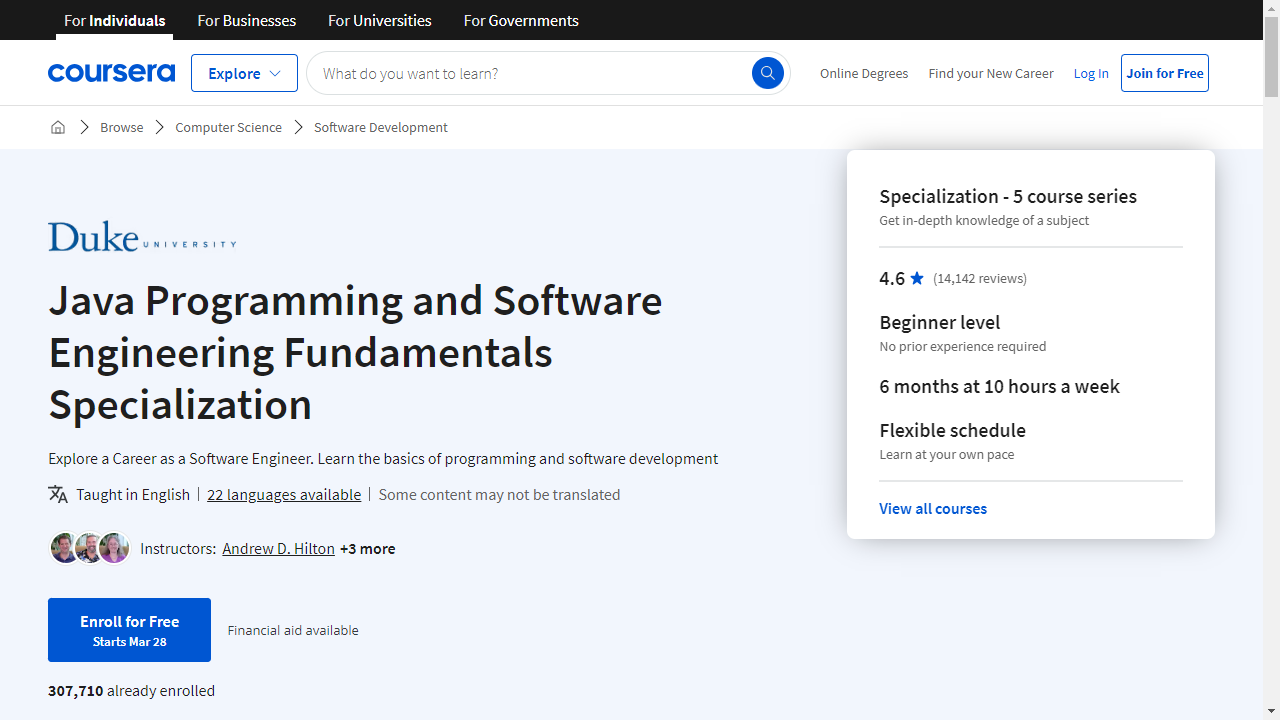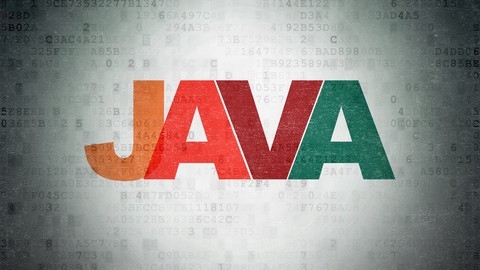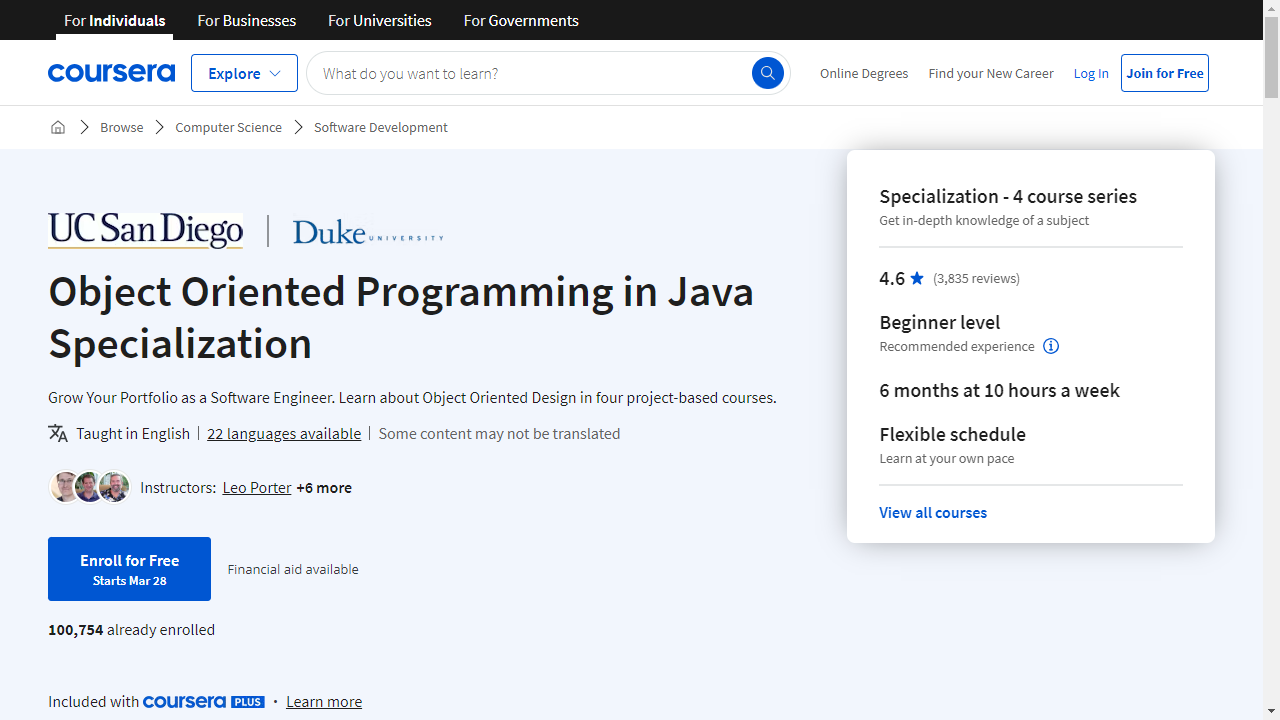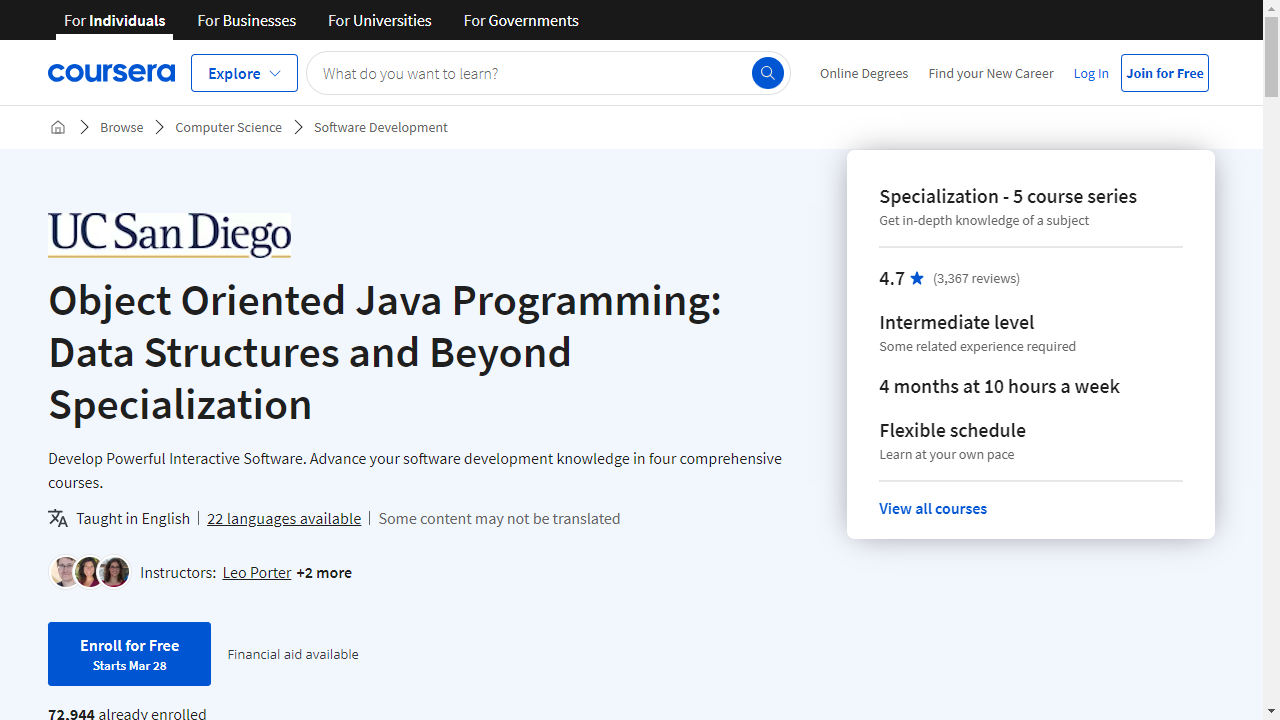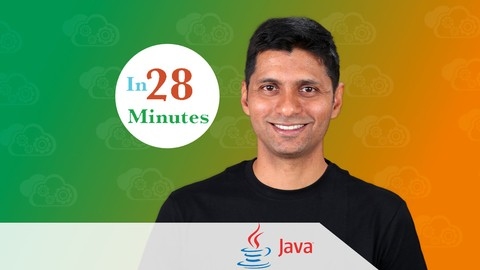Java programming is a highly sought-after skill in today’s tech-driven world.
As a versatile and widely-used language, Java is the backbone of countless applications, from web and mobile apps to enterprise-level systems and big data platforms.
By learning Java, you can open doors to a wide range of career opportunities in software development, web development, and more.
You’ll gain the ability to build robust, scalable, and high-performing applications, making you a valuable asset in any tech team.
However, finding the perfect Java course that fits your learning style and goals can be a challenge.
With so many options available online, it’s easy to feel overwhelmed and unsure where to start.
You’re looking for a course that provides a solid foundation in Java programming, covers essential concepts, and offers hands-on practice to solidify your understanding.
For the best Java programming course overall, we recommend the Java Programming and Software Engineering Fundamentals Specialization on Coursera.
This specialization offers a comprehensive and beginner-friendly approach to learning Java, covering everything from basic syntax to object-oriented programming principles.
You’ll build real-world projects and develop a strong understanding of software engineering concepts, making it an excellent choice for aspiring Java developers.
While the Java Programming and Software Engineering Fundamentals Specialization is our top pick, there are other excellent Java courses available that cater to different learning preferences and skill levels.
Whether you’re a complete beginner or have some programming experience, we’ve compiled a list of recommendations to help you find the perfect Java course for your journey.
Keep reading to explore more options and embark on your path to becoming a proficient Java programmer.
Java Programming and Software Engineering Fundamentals Specialization
Provider: Coursera
This specialization is a great starting point to become a skilled Java programmer.
It covers everything from the basics, like writing your first program, to more advanced ideas like object-oriented programming, which is a way to organize and reuse code.
You’ll be writing code from day one, learning by doing as you build real-world projects like programs to analyze data or even a movie recommendation system.
You’ll start by mastering the building blocks of Java, like loops and conditional statements.
As you progress, you’ll learn how to find and fix errors in your code, an important skill for any programmer.
You’ll even learn how to break down complex problems into smaller, more manageable pieces, a crucial strategy in software engineering.
The specialization doesn’t shy away from important computer science concepts either.
You’ll become comfortable working with data structures like arrays and ArrayLists, which are clever ways to organize and store information.
You’ll explore Java’s object-oriented features, learning to write code that’s reusable, efficient, and easier to manage for larger projects.
Finally, you’ll tie everything together by building a recommendation system, similar to how Netflix or Amazon suggest movies and products.
You’ll learn how to work with data, make calculations, and use your Java skills to build something practical.
By the time you’re finished, you’ll have a strong understanding of Java programming and the essential principles of software design.
Java Programming Nanodegree
Provider: Udacity
This Java Programming Nanodegree aims to boost your Java skills to the next level.
You will learn the core abilities needed to design, code, test, and launch top-notch Java software, just like professional Java developers.
The program begins with the basics of Java programming.
You will grasp core concepts such as classes, objects, and object-oriented programming.
You will explore data types, collections, and generics – all crucial for crafting robust applications.
You will even apply your skills to build a “Hotel Reservation Application,” gaining hands-on experience right from the start.
You will then move on to advanced Java programming techniques.
You will discover functional programming, a modern coding approach, and master file handling, input/output operations – essential for data management.
You will delve into design patterns, which are reusable solutions for common problems, and explore reflection, a powerful feature used to inspect and manipulate code.
Concurrent programming will also be a key focus, enabling you to develop applications capable of handling multiple tasks simultaneously.
To cement your advanced Java skills, you will build a “Parallel Web Crawler,” a challenging application showcasing your newfound abilities.
Finally, you will learn how to deploy your Java applications like a pro.
The Complete Java Certification Course
Provider: Udemy
This comprehensive Java course takes you on an exciting journey from beginner to proficient Java developer.
You will start by setting up your development environment with Eclipse and the JDK, getting your computer ready for coding.
Don’t worry; the course provides detailed instructions for both Windows and Mac.
You will then dive into the fundamentals of Java programming.
You will master variables, data types, arrays, and control flow mechanisms like if-else and switch statements.
You will also grasp the power of methods and understand how they are used to structure code efficiently.
The course then introduces the principles of object-oriented programming.
You will explore classes, objects, inheritance, interfaces, and abstract classes – the building blocks of robust Java applications.
You will solidify your knowledge with practical projects.
One exciting project involves building a car dealership application, putting your skills to the test in a real-world scenario.
You will also discover how to package your Java programs into executable JAR files, learning about concepts like compilation, object cloning, and serialization.
You will then master file processing and exception handling, crucial for developing reliable and user-friendly applications.
The Java Collections Framework will become your playground as you explore lists, sets, and maps – essential data structures for managing collections of data.
You will learn about generics, a powerful feature that allows you to write reusable code that can work with various data types.
Java’s concurrency model is demystified, and you will learn how to write multithreaded applications.
You will explore threads, synchronization techniques, and thread pools, gaining the skills to build responsive and efficient applications.
Finally, you will dive into the world of databases with JDBC (Java Database Connectivity), learning how to connect your Java applications to databases like MySQL.
You will learn how to execute SQL queries, insert data, update records, and delete information from a database – essential skills for any aspiring Java developer!
Object Oriented Programming in Java Specialization
Provider: Coursera
This Java specialization is perfect if you’ve already got some basic Java knowledge and want to go further.
You’ll begin with the “Java Programming: Solving Problems with Software” course, learning to design algorithms and write programs that work with different types of data.
You’ll even build a program that analyzes baby name trends!
Next, you’ll move on to “Java Programming: Arrays, Lists, and Structured Data,” where you’ll tackle more complex programs.
You’ll work with data structures like arrays and ArrayLists, learn about cryptography and hash tables, and even build your own encryption program.
Then, in “Object Oriented Programming in Java,” you’ll master object-oriented programming (OOP) concepts using data visualization.
You’ll understand classes, methods, and design patterns while building a more advanced, personally interesting program.
This course will also introduce you to graphical user interfaces and essential algorithms like sorting.
Finally, “Data Structures and Performance” will teach you how to work with massive amounts of data efficiently.
You’ll explore data structures like linked lists and trees, learning how to analyze their performance using Big-O notation.
This knowledge will help you create programs that are both fast and scalable.
Java Web Developer Nanodegree
Provider: Udacity
You start this Java Web Developer Nanodegree by learning the basics of Java programming, including variables, data types, and control flow.
You will use IntelliJ IDEA to write and debug your code.
Then, you will learn how to use Spring Boot, a popular framework for building web applications, to create REST APIs, use Spring MVC to handle web requests, and Thymeleaf to create dynamic web pages.
This Nanodegree also covers how to work with databases.
You will learn how to use JPA to interact with databases and explore different types of databases, including NoSQL databases like Kafka.
The curriculum then dives into building web services and APIs using Spring Boot.
You will learn about REST and GraphQL, two popular technologies for building APIs, and gain an understanding of microservices, a way to build scalable and maintainable applications.
You will also learn how to secure your APIs to protect sensitive data.
The course covers important security concepts like authentication and authorization, teaching you how to protect your applications from unauthorized access.
You will learn about DevOps practices such as continuous integration and continuous delivery (CI/CD) and use tools like Splunk to monitor your applications.
Throughout this Nanodegree, you will work on practical projects.
You will build SuperDuperDrive, a file storage application, a backend system for a car website, and even an e-commerce application to put your newfound security and DevOps skills to the test.
Finally, this Nanodegree doesn’t just focus on technical skills; it also helps you with your job search.
You’ll receive guidance on how to make your LinkedIn and GitHub profiles better, which can help you get noticed by potential employers.
Java 17 Masterclass: Start Coding in 2024
Provider: Udemy
You’ll begin by installing the Java Development Kit (JDK) on your Windows, Mac, or Linux computer.
You then learn Java fundamentals: variables, data types, operators, and control flow statements.
The course then teaches you object-oriented programming (OOP), including classes, objects, inheritance, polymorphism, composition, and encapsulation.
You learn to use arrays, lists, and other data structures.
You also learn Java 9’s features, like its module system, and how to update older Java projects to Java 9.
This masterclass covers generics, lambda expressions, streams, and Java’s collections framework.
You learn databases, including MySQL and SQLite, as well as input/output (I/O) operations, file handling, and networking.
You discover debugging and unit testing with JUnit to build solid Java applications.
You also learn JavaFX, a GUI toolkit for building desktop applications, by creating a to-do list application.
This course teaches you about databases using SQLite and MySQL.
You learn SQL to query and manipulate data and the JDBC API to interact with databases from your Java programs.
You gain experience with JPA and JPQL for database interactions.
The course teaches you how to use essential programming tools like the JDK 17 and the IntelliJ IDEA.
You’ll learn to set up each on Windows, Mac, and Linux.
You gain practical knowledge of unit testing using JUnit, allowing you to write automated tests for your code.
This course provides a solid foundation in Java programming and prepares you to build complex applications.
Object Oriented Java Programming: Data Structures and Beyond Specialization
Provider: Coursera
If you know a bit of Java and want to go further, this specialization is a great pick.
You’ll learn how to use Object-Oriented Programming (OOP) to write better Java code.
Plus, you’ll discover how to make your programs look cool with graphical user interfaces.
You’ll even learn how to make your programs run faster using special algorithms for searching and sorting.
Ever wondered how programs handle tons of data?
You’ll learn that too!
You’ll explore data structures like linked lists, trees, and hashtables – these are like special containers that help organize data efficiently.
You’ll even learn how to measure how fast your code runs using something called Big-O notation.
This helps you write programs that are super-fast and efficient.
This specialization also dives into real-world problems, like how Google Maps plans routes.
You’ll explore graphs, which are like maps for your data, and learn how to use them to solve complex problems.
You’ll even get to build your own route-planning application!
As your code gets more complex, you’ll discover how to design it so that it’s easy to understand and work with – which is super important when you’re working on big projects.
Finally, you’ll put everything you’ve learned into practice by analyzing data from social networks.
You’ll get to answer interesting questions like who the most influential people in a network are and how different groups are connected.
You’ll even present your findings in a video, just like a real software developer!
Java Programming for Complete Beginners
Provider: Udemy
This Java Programming for Complete Beginners course begins with the fundamentals, guiding you through the installation of Java and setting up your development environment.
You’ll work with JShell to understand variables, data types, operators, and expressions.
You will then explore Java methods, learning to create, call them, and work with arguments.
You’ll grasp the Java platform, including concepts like class and object, the role of the JVM, and the Eclipse IDE.
You’ll create your first Java project in Eclipse and build programs using what you learn.
The course includes many coding exercises to help you understand concepts like loops, conditionals, arrays, and ArrayLists.
You’ll explore object-oriented programming with topics like encapsulation, inheritance, and polymorphism and work with Java’s collections framework, including lists, sets, maps, and queues.
You’ll also venture into functional programming, exploring lambda expressions, streams, multi-threading, and exception handling.
The course concludes by teaching you how to read, write, and manipulate files and directories within Java’s file system.
Finally, you’ll be introduced to the Spring framework, including Spring Boot and JPA.
You’ll learn how to build REST APIs with Spring Boot and Spring Data JPA to create web services that interact with databases.
The course provides experience with JUnit for writing unit tests, Maven for managing dependencies, and JPA and Hibernate for working with databases.
Also check our posts on:
